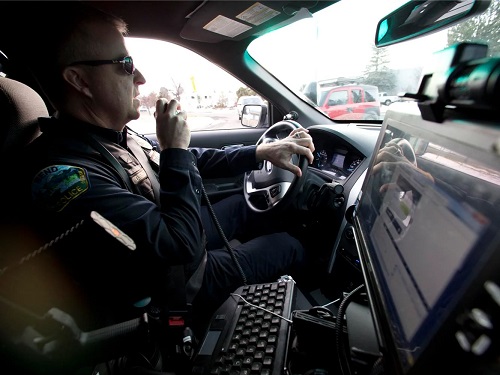
Bulletin file
6.15.22 – The Bulletin
Bend Police will stop automatically responding to some alarm calls. Police respond to hundreds of false alarms each year.
Alarms are among the most common calls for service to Bend Police, but over the past five years, the vast majority of alarm calls — more than 99% — have been false or did not result in a crime report.
Many of the recent calls were generated by activated motion detectors at empty second homes and unoccupied businesses. Sometimes, a pet is to blame. Sometimes, it’s an unlocked door and a gust of wind.
So to better use officer time, starting next month, Bend Police will employ a new system for prioritizing alarm calls. Essentially, alarms originating from home security systems will no longer go straight to emergency dispatchers. Instead, it will be the responsibility of the alarm company to “verify” an alarm call before notifying police.
“Like many other law enforcement agencies across the county, the city of Bend is moving to a verified alarm response program to ensure more efficient and equitable use of our limited public safety resources,” reads a March 15 letter sent to central alarm companies that operate in Bend.
According to figures provided by Bend Police, of 10,274 alarm calls for service between 2016 and 2020, only 76 resulted in police reports. Those reports were written for a variety of alleged activities, though only 26 were for burglaries. Police could not say how many cases resulted in conviction.
Zeroing in on 2020, there were 1,852 alarm calls that year from 892 different addresses. Of those, 351 were canceled; 1,258 were cleared as false, and 243 were cleared in other ways. The calls resulted in 21 crime reports, including 12 for burglary.
A small number of addresses appear to be responsible for an outsize number of alarm calls. In 2020, two addresses had more than 20 calls each. Eleven addresses had between 11 and 19 calls, and 60 addresses had five to 10 calls.
Often, the cause of the false alarm turns out to be a poorly secured front door blown open by the wind, according to Matt Kehr, president of Safe & Sound Alarm Systems in Bend. Or it’s a pet or wildlife investigating an empty second home or unoccupied business. Another major source of false alarms is aging equipment, which have duller sensors and lack verification ability.
“The biggest problem is always user error,” Kehr said. “I’ve been doing this 33 years and I accidentally set off my alarm. We are imperfect. We make mistakes.”
The shift to verification comes at a time when a staffing shortage has reduced the amount of time Bend officers can spend on traffic patrol and case follow-up.
This week, the agency is hiring up to nine sworn officers and six unsworn staff members.
In 2020, 42 calls took longer than an hour; 151 took between a half-hour and an hour, and 993 took between six minutes and a half-hour. The average response time was around 45 minutes.
“Think of all the other things we could be doing — other things to benefit community,” Bend Police spokeswoman Sheila Miller said. “A lot of officer time has been spent on these calls when they could be conducting traffic stops, investigating crimes, conducting community policing and engaging in other valuable services to our city.”
The city has an alarm ordinance and a fine system for false alarms. Under the law, an owner responsible for three false alarms within 12 months may be subject to fines and police will no longer respond to alarms at their address. But because there’s no permit or registration process for alarms in Bend, enforcing the ordinance has proven difficult, Miller said.
According to the March 15 letter to alarm companies, the city will still respond to certain calls considered priority. These include hold-up or “duress” alarms that indicate a person is being robbed. Bend officers will also automatically respond to all alarms at public school buildings, governmental and law enforcement facilities, businesses, pharmacies and locations that store large amounts of firearms.
The shift to alarm verification shouldn’t seriously impact the handful of Bend-based alarm companies, according to Kehr, whose company has operated in Bend for 33 years.
Many alarm companies already offer verification, as hiring struggles in law enforcement are not limited to Central Oregon, Kehr said.
“I can’t blame them,” Kehr said. “When you’re short personnel, you do what you have to do.”
In addition to alarm verification, Redmond has a permit system for home alarms, meaning the city also collects revenue. Bend is not considering that option.
Safe & Sound sells burglar alarms most residential and business customers choose to support with optional security cameras. So when an alarm signal is transmitted to Safe & Sound’s central station in Bend, agents there first determine the nature of the call — if it’s a fire, medical or police emergency. If the alarm signals an intruder is present at a property, the agent will then check the associated cameras for unidentified people, and likely call the alarm owner.
The alarm industry is working to reduce false alarms, Kehr said. Alarms manufactured today have so-called pet immunity, and won’t register creatures weighing, for instance, up to 100 pounds. Advancements in cellphone apps have helped, as well. For example, another common type of false alarm is when a resident comes home and fails to disarm the alarm within the 30-second window. But home security apps now know if the owner has recently returned home due to GPS tracking.
